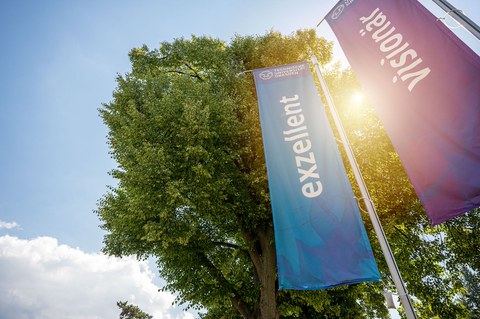15.11.2022
10 Jahre Exzellenz: TU Dresden auf dem Weg zur Weltspitze
Der November 2012 markiert einen Meilenstein in der Geschichte der TU Dresden: Vor zehn Jahren begann die Förderung als eine der elf Exzellenzuniversitäten in Deutschland. Der Exzellenzstatus hat an der TUD eine hohe Veränderungsdynamik ausgelöst: Die Universität ist interdisziplinärer und internationaler geworden, sie zieht herausragende Wissenschaftlerinnen und Wissenschaftler aus aller Welt an. So kann die TU Dresden ihre Position in der Spitzengruppe der deutschen Universitäten festigen und sich Weltniveau annähern. „Die Exzellenz ist nicht nur treibende Kraft für die herausragende Forschung an den Grenzen des Wissens – sie ist insgesamt ein Motor für Innovation“, sagt Rektorin Prof. Ursula Staudinger. „Sie wirkt auf vielfältige Weise in die gesamte Universität hinein und darüber hinaus.“
Die besten Köpfe weltweit anziehen
Längst gehört die TUD zu den leistungsfähigsten Hochschulen bundesweit und in einigen Disziplinen wie den Lebenswissenschaften und Quantenmaterialien auch global. Otger Campàs, Professor für Gewebedynamik, wechselte 2021 von der University of California nach Dresden, weil die TUD „weltweit eine der erfolgreichsten interdisziplinären Institutionen im Bereich der Physik des Lebens ist, die Biologie, Physik und Ingenieurwissenschaften zusammenbringt“. Auch für die Digital Cultures und die Zukunft der Mobilität konnten internationale Spitzenforscherinnen und -forscher gewonnen werden, um das wissenschaftliche Profil auszubauen und zu schärfen. Flankierend ist die Universität zu einem der größten deutschen Zentren für interdisziplinäre digitale Wissenschaften sowie Künstliche Intelligenz geworden und maßgeblich am Aufbau der Nationalen Dateninfrastruktur (NFDI) beteiligt.
Exzellente Forschung vorantreiben
Die Forschungsstärke der TUD spiegelt sich zuvorderst in den drei Exzellenzclustern wieder, die in der zweiten Förderphase (2019 bis 2026) eingeworben wurden. Bei CeTI (Centre for Tactile Internet with Human-in-the-Loop) forschen Wissenschaftlerinnen und Wissenschaftler der Informatik, Ingenieurwissenschaften, Medizin und Psychologie an der Demokratisierung von Fähigkeiten, die es beispielsweise jeder Person ermöglichen, einen Roboter anzulernen. Dem Exzellenzcluster ct.qmat (Complexity and Topology in Quantum Matter; ein gemeinsames Cluster mit der Julius-Maximilians-Universität Würzburg) ist es gelungen, ein nur sandkorngroßes Lasernetzwerk zu entwickeln, das wie ein einziger Laser agiert. Damit lässt sich zum Beispiel die Leistung von bestimmten Mikrolasern steigern, die in Mobiltelefonen, Glasfasernetzen und anderen Alltagstechnologien bereits fest verankert sind. Perspektivisch werden die neuesten Forschungsergebnisse aus den Clustern auch in die Lehre eingebunden. Das Exzellenzcluster PoL (Physics of Life), das die Selbstorganisation von Zellen mithilfe physikalischer Gesetze untersucht, hat einen Masterstudiengang aus Biophysik und Molekularbiologie gestartet. Auch die Cluster cfaed (Center for Advancing Electronics Dresden) und CRTD (Center for Regenerative Therapies Dresden) aus der ersten Förderperiode von 2012 bis 2019 werden auf Exzellenzniveau weiterbetrieben.
DRESDEN-concept: ein wichtiges Element der Erfolgsgeschichte
Die enge Zusammenarbeit mit den außeruniversitären Forschungseinrichtungen im Rahmen des DRESDEN-concept Science und Innovation Campus spielt eine wichtige Rolle. Zwölf Jahre nach der Gründung ist eine einzigartige Wissenschaftsallianz entstanden aus der TUD und über 30 Forschungseinrichtungen, darunter 3 Max-Planck-, 9 Fraunhofer-, 3 Helmholtz- und 4 Leibniz-Institute sowie forschende Kulturpartner wie die Staatlichen Kunstsammlungen Dresden. „Wir sind sehr stolz auf den DRESDEN-concept Science und Innovation Campus, der bundesweit Nachahmung gefunden hat, und wollen die Zusammenarbeit beispielsweise im Bereich des Talent Management und der Technologieplattformen weiter intensivieren“, sagt Rektorin Prof. Staudinger. „In der Bündelung der Stärken der außeruniversitären Institutionen und der Universität liegt eine der Stärken des Standorts Dresden.“
Technologietransfer stärken
Die TUD zählt mittlerweile deutschlandweit zu den drittmittelstärksten Hochschulen. 2021 warb sie 305 Mio. Euro ein. Im Förderatlas der Deutschen Forschungsgemeinschaft hat sie sich über die letzten zehn Jahre kontinuierlich verbessert und belegt nun den fünften Platz. Die DFG lobt den Aufstieg als „wahre Erfolgsgeschichte“. Erfolgreich ist die TUD auch beim Einwerben von Forschungsförderung des European Research Council (ERC). Allein in diesem Jahr konnten sechs ERC-Grants eingeworben werden.
In der Exzellenzphase wurde auch der Transfer von Forschungsergebnissen in die Wirtschaft deutlich ausgebaut. Mit jährlich 85 prioritätssichernden Patentanmeldungen und 120 Erfindungsmeldungen ist sie heute eine der patentaktivsten Hochschulen in Deutschland. Der Start-up-service dresden|exists generiert jährlich über 2.000 Projekte mit Unternehmen und begleitet rund 20 Ausgründungen. Aus der TUD sind so millionenschwere Firmen wie Novaled und das Robotik-Start-up Wandelbots hervorgegangen.
Als gesellschaftliche Akteurin will die TUD auch ihren Beitrag zur Gestaltung des Strukturwandels in der Lausitz leisten. In das kürzlich von Bund und Land zur Förderung ausgewählte Großforschungszentrum Deutsches Zentrum für Astrophysik (DZA) bringt die TUD ihre herausragende Expertise in den Bereichen Data Analytics, Künstliche Intelligenz, High Performance Computing und Green Electronics ein und übernimmt zugleich die Projektträgerschaft in den ersten drei Jahren.
„Unsere Vision ist es, die TU Dresden als global bezogene und regional verankerte Spitzenuniversität für das 21. Jahrhundert weiterzuentwickeln. Dazu gehört auch, den Status als Exzellenzuniversität zu verstetigen und weitere Exzellenzcluster zu etablieren“, sagt Rektorin Prof. Staudinger. „Wir können dabei hervorragend auf dem aufbauen, was in den letzten zehn Jahren an der TUD erreicht worden ist.“
Anlässlich des Jubiläums wurde der Film "Bright Minds. Excellent Research" produziert, der einen Einblick gibt, wie passionierte Forscherinnen und Forscher an der TUD an Lösungen der großen globalen Herausforderungen arbeiten.
10 Jahre Exzellenz: Der Film "Bright Minds. Excellent Research" einen Einblick, wie passionierte Forscherinnen und Forscher an der TU Dresden an der Lösung der großen globalen Herausforderungen arbeiten. © AVANGA Filmproduktion
Fakten:
Die Exzellenzstrategie ist ein Förderprogramm von Bund und Ländern, um die internationale Wettbewerbsfähigkeit Deutschlands zu verbessern. Den Titel „Exzellenzuniversität“ erlangte die TU Dresden 2012 und verteidigte ihn 2019. Sie ist damit eine von elf Exzellenzuniversitäten. Nach sieben Jahren, 2026, erfolgt eine wissenschaftliche Evaluierung. Voraussetzung für den Titel sind mindestens zwei Exzellenzcluster.
Zur TU Dresden gehören ca. 8.700 Beschäftigte und ca. 30.000 Studierende. Der Anteil der internationalen Studierenden liegt im Wintersemester 2022/23 bei knapp 19 Prozent. Vor zehn Jahren waren es noch etwa 11 Prozent. Auch bei den wissenschaftlichen Mitarbeitenden gab es eine Steigerung von knapp zehn auf über 20 Prozent. Die Zahl der internationalen Hochschullehrenden verdoppelte sich auf über zehn Prozent. Im gleichen Zeitraum erhöhte sich auch der Anteil der Professorinnen um etwa 10 Prozent auf fast 22 Prozent.
Kontakt:
Pressestelle TU Dresden
Tel.: +49 351 463 32398
E-Mail: pressestelle@tu-dresden.de

